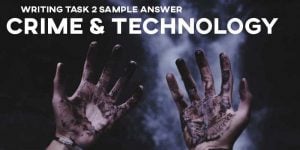This is an IELTS writing task 2 sample answer essay from the real exam on the topic of the internet and schools.
Education and technology/the internet are really common topics on IELTS so reading this can really help you to prepare!
Please consider signing up for my Patreon here in order to support my efforts and receive exclusive Ebooks and materials related to IELTS!
Dave
IELTS Writing Task 2 Sample Answer Essay: The Internet & School (Real Past IELTS Exam/Test)
Some today argue that schools are no longer necessary because children can learn so much from the internet and be educated at home.
To what extent do you agree or disagree?
Real Past IELTS Exam/Test
There are some today who would argue that the internet has sufficiently supplanted the role of traditional education so as to make it redundant. In my opinion, though the internet opens up possibilities for learning, schools are a crucial filter.
What separates the internet from how other advances in technology have impacted education is greater accessibility to information. It is no exaggeration to claim that nearly everything can be found on the internet. School age children can access educational videos on YouTube, read online articles and use interactive learning platforms. As they get older, the possibilities expand and include scholarly articles, video-conferencing platforms like Zoom, and online newspapers from every country in the world that can be translated to your native language in modern internet browsers. There is immense potential for autodidacts and parents who choose to homeschool.
Nonetheless, schools are the real world editors of the internet. A lot of news is thrown up instantly and not carefully vetted. This means that students can get led into dark corners such as alt-left and right websites that specialise in sensationalised propaganda. Children and teens are especially susceptible to what they read online as they might be less skeptical. Teachers have more life experience and their training helps them approach information critically. They can then pass these skills on to their pupils by teaching them how to read closely, spot biases, and check information through a number of primary and secondary sources. Without teachers, students are more likely to be indoctrinated rather than educated.
In conclusion, teachers are important to dispel the inherent risks of unreliable online information. Schools and administrators ought to take a long-view in order to assess the value of the internet for learning.
Analysis
1. There are some today who would argue that the internet has sufficiently supplanted the role of traditional education so as to make it redundant. 2. In my opinion, though the internet opens up possibilities for learning, schools are a crucial filter.
- I paraphrase the question to start.
- Then I include a clear opinion.
1. What separates the internet from how other advances in technology have impacted education is greater accessibility to information. 2. It is no exaggeration to claim that nearly everything can be found on the internet. 3. School age children can access educational videos on YouTube, read online articles and use interactive learning platforms. 4. As they get older, the possibilities expand and include scholarly articles, video-conferencing platforms like Zoom, and online newspapers from every country in the world that can be translated to your native language in modern internet browsers. 5. There is immense potential for autodidacts and parents who choose to homeschool.
- This is my topic sentence with a clear main idea at the end of it.
- I explain my main idea next.
- After that I give some specific examples.
- I continue with more examples as children get older.
- Finally I conclude by drawing a conclusion from this.
1. Nonetheless, schools are the real world editors of the internet. 2. A lot of news is thrown up instantly and not carefully vetted. 3. This means that students can get led into dark corners such as alt-left and right websites that specialise in sensationalised propaganda. 4. Children and teens are especially susceptible to what they read online as they might be less skeptical. 5. Teachers have more life experience and their training helps them approach information critically. 6. They can then pass these skills on to their pupils by teaching them how to read closely, spot biases, and check information through a number of primary and secondary sources. 7. Without teachers, students are more likely to be indoctrinated rather than educated.
- Another topic sentence with a single main idea at the end.
- I start explaining my argument.
- Notice the very specific examples of the results.
- I continue to develop the same argument.
- By related this back to teachers, I make my argument stronger.
- I fully draw out the results here.
- Notice this paragraph is longer – that’s fine because this is the side that I agree with.
1. In conclusion, teachers are important to dispel the inherent risks of unreliable online information. 2. Schools and administrators ought to take a long-view in order to assess the value of the internet for learning.
- My conclusion starts with repeating my opinion.
- I finish with a final detail/thought.
Vocabulary
What do the words in bold below mean?
There are some today who would argue that the internet has sufficiently supplanted the role of traditional education so as to make it redundant. In my opinion, though the internet opens up possibilities for learning, schools are a crucial filter.
What separates the internet from how other advances in technology have impacted education is greater accessibility to information. It is no exaggeration to claim that nearly everything can be found on the internet. School age children can access educational videos on YouTube, read online articles and use interactive learning platforms. As they get older, the possibilities expand and include scholarly articles, video-conferencing platforms like Zoom, and online newspapers from every country in the world that can be translated to your native language in modern internet browsers. There is immense potential for autodidacts and parents who choose to homeschool.
Nonetheless, schools are the real world editors of the internet. A lot of news is thrown up instantly and not carefully vetted. This means that students can get led into dark corners such as alt-left and right websites that specialise in sensationalised propaganda. Children and teens are especially susceptible to what they read online as they might be less skeptical. Teachers have more life experience and their training helps them approach information critically. They can then pass these skills on to their pupils by teaching them how to read closely, spot biases, and check information through a number of primary and secondary sources. Without teachers, students are more likely to be indoctrinated rather than educated.
In conclusion, teachers are important to dispel the inherent risks of unreliable online information. Schools and administrators ought to take a long-view in order to assess the value of the internet for learning.
Answers
sufficiently supplanted replaced enough
so as to make enough to allow for
redundant not needed
opens up possibilities creates chances
crucial filter important judge
separates keeps apart from
greater accessibility more availability of
exaggeration hyperbole
claim argue
access get into
interactive learning platforms websites for learning online
expand increase
scholarly articles academic journals
video-conferencing platforms talking through video on apps
Zoom a popular video-conferencing app
native language L1
modern internet browsers Chrome, Microsoft Edge, etc.
immense potential lots of possibility
autodidacts people who teach themselves
homeschool learning at home, not school
real world editors people who shift and filter
thrown up instantly not checked
not carefully vetted not verified
dark corners dangerous areas
alt-left and right extreme liberals and conservatives
specialise focus in on
sensationalised propaganda fanatical views
especially susceptible vulnerable
skeptical questioning
life experience jaded
approach information critically take everything with a grain of salt
pass these skills on instill in others
pupils students
read closely read carefully and slowly
spot biases be able to identify the writer’s purpose
primary and secondary sources firsthand and collected books/articles
indoctrinated persuaded
dispel get rid of
inherent risks always present dangers
unreliable online information can’t be trusted
long-view long-term
assess judge
Pronunciation
Listen and repeat:
səˈfɪʃəntli səˈplɑːntɪd
səʊ æz tuː meɪk
rɪˈdʌndənt
ˈəʊpənz ʌp ˌpɒsəˈbɪlɪtiz
ˈkruːʃəl ˈfɪltə
ˈsɛprɪts
ˈgreɪtər əkˌsɛsɪˈbɪlɪti
ɪgˌzæʤəˈreɪʃən
kleɪm
ˈæksɛs
ˌɪntərˈæktɪv ˈlɜːnɪŋ ˈplætfɔːmz
ɪksˈpænd
ˈskɒləli ˈɑːtɪklz
ˈvɪdɪəʊ-ˈkɒnfərənsɪŋ ˈplætfɔːmz
zuːm
ˈneɪtɪv ˈlæŋgwɪʤ
ˈmɒdən ˈɪntəˌnɛt ˈbraʊzəz
ɪˈmɛns pəʊˈtɛnʃəl
ˈɔːtəʊ daɪdækts
həʊmskuːl
rɪəl wɜːld ˈɛdɪtəz
θrəʊn ʌp ˈɪnstəntli
nɒt ˈkeəfli ˈvɛtɪd
dɑːk ˈkɔːnəz
ælt-lɛft ænd raɪt
ˈspɛʃ(ə)laɪz
sɛnˈseɪʃənlaɪzd ˌprɒpəˈgændə
ɪsˈpɛʃəli səˈsɛptəbl
ˈskɛptɪkəl
laɪf ɪksˈpɪərɪəns
əˈprəʊʧ ˌɪnfəˈmeɪʃən ˈkrɪtɪkəli
pɑːs ðiːz skɪlz ɒn
ˈpjuːplz
riːd ˈkləʊsli
spɒt ˈbaɪəsɪz
ˈpraɪməri ænd ˈsɛkəndəri ˈsɔːsɪz
ɪnˈdɒktrɪneɪtɪd
dɪsˈpɛl
ɪnˈhɪərənt rɪsks
ˌʌnrɪˈlaɪəbl ˈɒnˌlaɪn ˌɪnfəˈmeɪʃən
lɒŋ-vjuː
əˈsɛs
Vocabulary Practice
Remember and fill in the blanks:
There are some today who would argue that the internet has s_____________________d the role of traditional education s_____________e it r____________t. In my opinion, though the internet o________________________s for learning, schools are a c________________r.
What s__________s the internet from how other advances in technology have impacted education is g______________________y to information. It is no e__________________n to c_______m that nearly everything can be found on the internet. School age children can a________s educational videos on YouTube, read online articles and use i_______________________________s. As they get older, the possibilities e_________d and include s_________________s, v____________________________s like Z___m, and online newspapers from every country in the world that can be translated to your n________________e in m__________________________s. There is i_____________________l for a__________________s and parents who choose to h______________l.
Nonetheless, schools are the r____________________s of the internet. A lot of news is t_____________________y and n____________________d. This means that students can get led into d_________________s such as a___________________t websites that s______________e in s______________________a. Children and teens are e_______________________e to what they read online as they might be less s____________l. Teachers have more l____________________e and their training helps them a______________________________y. They can then p________________________n to their p___________s by teaching them how to r______________y, s______________s, and check information through a number of p_________________________________s. Without teachers, students are more likely to be i___________________d rather than educated.
In conclusion, teachers are important to d________l the i______________s of u______________________n. Schools and administrators ought to take a l______________w in order to a_________s the value of the internet for learning.
Listen and check:
Listening Practice
Here’s what Bill Gates think:
…and you can also listen to my IELTS speaking answer on a subject that I would eliminate from schools:
Reading Practice
Read a counter-point here:
https://www.wired.com/story/education-is-human-thing-covid-19-will-push-online/
Speaking Practice
Answer the related questions below about teachers from the real exam:
Teachers
Did you ever want to be a teacher?
Real IELTS Speaking Exam
Which teacher do you remember best?
What did you like most about your teachers?
Do teachers remember their students in your country?
Writing Practice
Answer this similar question then check with my sample answer below:
Some believe that money for education should mainly be spent on better computers while others believe it would be better spent on teachers.
Discuss both views and give your own opinion.
Real Past IELTS Exam/Test







Hi Dave
The uploaded audios are from previous instructions.
You are the best
Thanks a lot – I will fix that!
great Dave
very useful material, really
Thank you!
your materials are awesome…thank you
Thanks so much – you’re awesome for say that!
Thank you so much!
I learned a lot!
Thankssssssssss
You’re welcome!